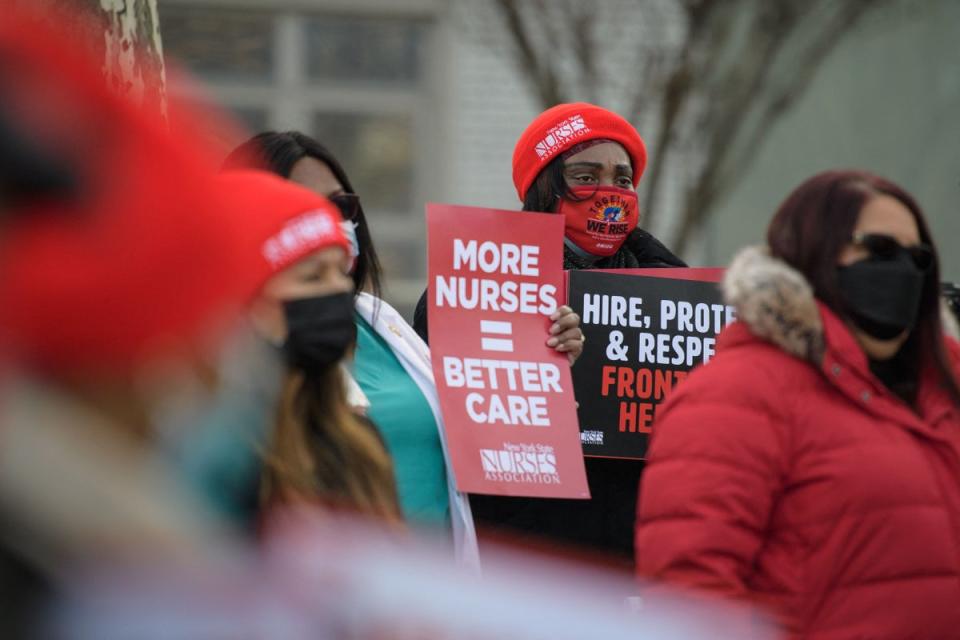Thousands of New York nurses prepare for ‘last resort’ strike as hospitals scramble to prepare
Thousands of unionised nurses from hospitals across New York City are preparing for a potential strike after the expiration of their current contracts in the midst of a “tridemic” public health crisis, including the ongoing Covid-19 pandemic and an explosion of respiratory illness.
Nurses have demanded better caregiver-to-patient ratios, stronger benefits and wages to keep pace with inflation, and solutions to solve chronic staffing issues in their ongoing contract negotiations after their contracts expired in December.
On 9 January, one of the largest nurses strikes in US history will move ahead if tentative agreements are not reached at eight hospitals, including Flushing Hospital Medical Center, Maimonides, Montefiore, Mount Sinai Hospital, Mount Sinai Morningside and West, BronxCare, NewYork-Presbyterian and Richmond University Medical Center.
As of 5 January, such agreements have been reached with nurses at three of those hospitals, including Presbyterian, Maimonides and Richmond, according to the New York State Nurses Association, the union that represents 42,000 nurses in the state.
As many as 10,000 nurses could strike next week if workers don’t reach agreements with the other five hospitals, which are bracing for strikes with potential plans to transfer newborns from intensive care units, cancel elective procedures, discharge patients early, and divert ambulances away from their facilities.
“Our bosses created the understaffing crisis by failing to hire and retain enough nurses. We are trying to solve the crisis by creating a fair contract, but they are fighting against us,” New York State Nurses Association president and registered nurse Nancy Hagans told reporters at a virtual briefing on 5 January.
“Instead of wasting time and resources and money, they could … allocate to the nurses right now and improve staffing,” she said. “They need to come to the table and negotiate a fair contract.”
She stressed that a widespread strike is a “last resort” after “sounding the alarm” about the staffing crisis on the heels of a critical inflection point in an overburdened hospital system.
“During the height of the pandemic we went way above and beyond … It has taken a toll on our nurses, physically and mentally,” she said. “We also want you to be safe when we care for you.”
Four other hospitals – Brooklyn Hospital Center, Kingsbrook Jewish Medical Center, Interfaith Medical Center, and Wyckoff Heights Medical Center, which include roughly 1,200 nurses with the New York State Nurses Association – are also preparing for potential strikes.
“Hospital management abandoned nurses at the height of the pandemic, as we dealt with death and trauma at a 9/11-level every single day, and they’re abandoning nurses and patients now, in the midst of a tripledemic of Covid, RSV and flu, by putting their bottom line above patient care,” according to pediatric ER nurse Aretha Morgan. “We are fed up and won’t take it anymore.”
A memo from officials with Mount Sinai Hospital, Mount Sinai Morningside and Mount Sinai West said the facilities have “no choice” but to move ahead with its strike plans, which include diverting ambulances from the hospitals, only scheduling emergency procedures at certain facilities, discharging eligible patients, and transferring patients – including babies in the ICU – outside of the health system “to ensure they get the care they so desperately need.”

A statement from a Mount Sinai spokesperson said the hospital system’s goal “is to reach an agreement that continues to provide our valued nurses with competitive compensation and benefits and ensures a safe, supportive working environment that enables them to provide exceptional care to all our patients across the diverse communities we serve.”
Hospital administrators at Mount Sinani and Montefiore offered contracts comporable to those reached with nurses at New York-Presbyterian but were rejected, according to statements from hospital spokespeople.
A spokesperson for Montefiore said it made its offer despite financial issues within the health system, which lost more than $117m within the first nine months of 2019, according to Gothamist’s review of its financial statements.
But Ms Hagans said that Montefiore “has some of the highest-paid hospital executives in all New York City.” Crain’s reported that the average compensation for New York City hospital executives was $4.48m in 2020.
Each hospital individually negotiates contract terms with their nurses. Depending on such talks, as they continue over the next several days ahead of the looming strike deadline, there could be several strikes or none at all.
If hospitals fail to reach agreements and strikes move ahead, “it could be an enormous public health calamity,” Ken Raske of the Greater New York Hospital Association told NBC New York.
Nurses have argued that the hospital systems have laid the groundwork for that potential chaos by failing to adequately staff, which nurses unions and workers across the US have warned throughout the pandemic while hospitals made record profits.
“Understaffing – the refusal of our hospitals to adhere to minimum nurse-to-patient ratios or reasonable caseloads for community care providers – results in preventable morbidity and mortality rates for our patients,” registered nurse Judy Sheridan-Gonzalez wrote for the New York union.
“But our employers refuse to listen to us when we try to salvage what’s left of the nursing profession and insist upon being able to fulfill our role in caring for our patients,” she said.
Despite the economic fallout from the pandemic and rising healthcare costs, hospital executives in the state received $73m in bonuses in 2020. Two-thirds of nurses across the US, meanwhile, plan to quit in coming years, with 99 per cent reporting chronic staffing issues at their workplace.

